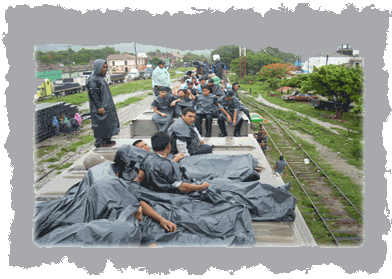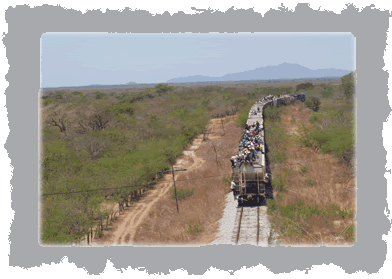Rant: No, A Beer Won't Fix Anything
So instead of an extremely heated, long overdue, loud and tenacious national argument about police exceptionalism, an argument that's been overdue in this country for decades, we have a tepid discussion of the symbolism of the kinds of beer consumed at the White House. Personally, I think we'd be a lot better off with the actual argument. An actual confrontation with the pervasive evil evidenced Professor Gates's arrest.
A brief bit of context, if you will. The reason why evidence seized by cops in illegal searches is suppressed in this country, is that numerous judicial slaps on the wrist over decades didn't make policeman follow the Constitutional Fourth Amendment law of search and seizure. So the Supreme Court had to introduce the suppression rule. Basically, if the constable blunders (or intentionally ignores the constitution and laws of the US) the illegally seized evidence is suppressed and the accused goes free. Has this rule, now in effect of almost 50 years, deterred the police from making illegal searches and seizures? No it has not. They do so with amazing frequency. This law has resulted only in numerous court decisions watering down the rule, handwringing that the accused should hnot be freed. It has not made police toe the line. It has made them surly. It has made the rogue cops. And the police clamor to be able to break the law with impunity has, to no one's surprise, cowered the courts. The courts would rather expand the cops' rights to break the law than require them to follow it. It's a legitimate question whether anything can make the police toe the line.
And what about Miranda warnings? The reason why Miranda warnings were required was that cops were extorting confessions from people they had taken into custody and their tactical manuals, explaining how this should be done, appalled even the US Supreme Court. Again, numerous judicial slaps on the wrist over decades didn't stop police from using coercive interrogation methods to extract involuntary confessions, so the Court required Miranda warnings to be given before there could be a custodial interrogation. Has this stopped police from coercing confessions? No it has not. This rule too has spawned numerous court decisions watering down the rule and judicial handwringing. It has not stopped police from coercing involuntary confessions. Now some states require that all interrogations be videotaped so that police might stop producing unreliable and false confessions of crimes. Will that work? Or will police find a way to subvert that rule also? I'm skeptical. What are police thinking when they coerce false confessions. What they are thinking is that they are doing God's work and that those of us who are not "on the job" don't know about the battle that goes on on the streets between good (the cops) and evil (those they arrest and interrogate).
Are these circumstances that prompt us to have a beer? I think not.
You can read in today's press that a lawyer in DC was arrested last night for shouting that he hated the police. Police evidently heard him express his opinion. This lack of "respect," the word used in the article, which as far as I can tell was a Constitutional exercise of free speech, was a reason for calling him a homophobic slur and arresting him for the bogus charge of disorderly conduct. Has the affaire de Gates made any difference to the DC cops who arrested him for lack of respect? Evidently not. Has it made any difference to any cops? Doubtful.
Can we fix this by having a beer? I doubt it.
There have been more than 135 exonerations of people who were on death row since the resumption of the death penalty in the US. The next exoneration, the next one that will be announced, is on its way, so there is right now somebody sitting on death row in a prison who doesn't belong there because s/he is innocent, completely and utterly innocent of the crime for which s/he was convicted and sentenced to death. And how did this innocent person in all probability get convicted and sent to death row? Chances are good it involves shoddy or intentionally improper police work. Can we estimate how many innocent people of the more than 2 million presently incarcerated in the US are actually innocent? No, we cannot. But we do know that when exonerations occur they come from involuntary, false confessions, jail house snitch testimony, and faulty or suggestive identification procedures. In two words, they come from police practices. The police are using the system to put innocent people in prison and perhaps to death. And this happens with regularity. It's far too common.
Can we eliminate the long term incarceration and potential execution of innocent people by having a beer? Not a chance. Can we address this issue? No.
Some may want to talk about how Obama's drinking a Bud Light means something, and how drinking Red Stripe means something, and how drinking a bland Coors product means something. That shows wonderful gifts in discerning the claimed political symbolism of today's tete a tete. That enrages me. Why? Because I'd like the see 1/100th of the same attention and analytical skills applied to correcting the obvious and pervasive police abuse in this country. I'd like to see it applied to correcting the racial disparities and wealth disparities among prisoners. I'd like to see it applied to making the criminal justice system fair.
Obama was right. The Gates affair provided a teachable moment. Too bad that the Trad MediaTM couldn't figure out what needed to be taught. Too bad that the President cowered before the long, blue line, when he should have confronted the real issues. Too bad that I'm writing this rant and that the moment for beginning to deal honestly with the police is now again relegated to the background. It's a topic for discussion in jails and prisons. Some beer hasn't solved the problem, but it's relegated it to obscurity. Until the next illegal, unconstitutional arrest of a celebrity.
Etiquetas: criminal justice, Henry Louis Gates, police, rant








.jpg)








